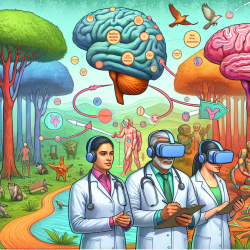Introduction
In the field of neuropsychology, understanding and measuring executive dysfunctions in schizophrenia is crucial for effective diagnosis and treatment. A recent critical review, Executive Dysfunctions in Schizophrenia: A Critical Review of Traditional, Ecological, and Virtual Reality Assessments, highlights the importance of using a variety of assessment tools, including traditional, ecological, and virtual reality (VR) methods, to accurately evaluate these dysfunctions.
Traditional vs. Ecological and VR Assessments
Traditional assessments, while valuable, often lack the ecological validity necessary to predict real-world functioning. They typically involve structured tasks that do not fully capture the complexities of everyday life. In contrast, ecological and VR assessments offer higher levels of verisimilitude, meaning they better mimic real-life situations and cognitive demands.
Ecological assessments, such as the Executive Function Performance Test (EFPT) and the Multiple Errands Test (MET), are designed to evaluate executive functions in scenarios that closely resemble daily activities. These tools have demonstrated higher veridicality, indicating a stronger correlation with real-world outcomes.
VR assessments take this a step further by immersing individuals in realistic, interactive environments. This approach not only enhances the ecological validity of the assessment but also allows for the evaluation of complex cognitive processes in a controlled setting.
Implications for Practitioners
For practitioners, integrating ecological and VR assessments into their diagnostic toolkit can lead to more accurate identification of executive dysfunctions in schizophrenia. These tools provide a comprehensive view of a patient's cognitive abilities and limitations, enabling tailored interventions that address specific needs.
Moreover, the use of VR technology in assessments is particularly promising. It allows for the simulation of various scenarios, providing insights into how patients might navigate real-world challenges. This information is invaluable for developing effective therapeutic strategies that enhance patients' quality of life.
Encouraging Further Research
While the current research underscores the potential of ecological and VR assessments, it also highlights the need for further studies. Understanding the neurobiological and psychopathological correlates of executive dysfunction in schizophrenia is essential for advancing treatment approaches. Future research should focus on exploring the relationships between brain structure, cognitive functions, and real-world behaviors using these innovative assessment tools.
Conclusion
As practitioners, embracing data-driven approaches and incorporating cutting-edge assessment tools can significantly improve outcomes for individuals with schizophrenia. By leveraging the insights gained from ecological and VR assessments, practitioners can develop more effective, personalized interventions that support patients in achieving better functional outcomes.
To read the original research paper, please follow this link: Executive Dysfunctions in Schizophrenia: A Critical Review of Traditional, Ecological, and Virtual Reality Assessments.










